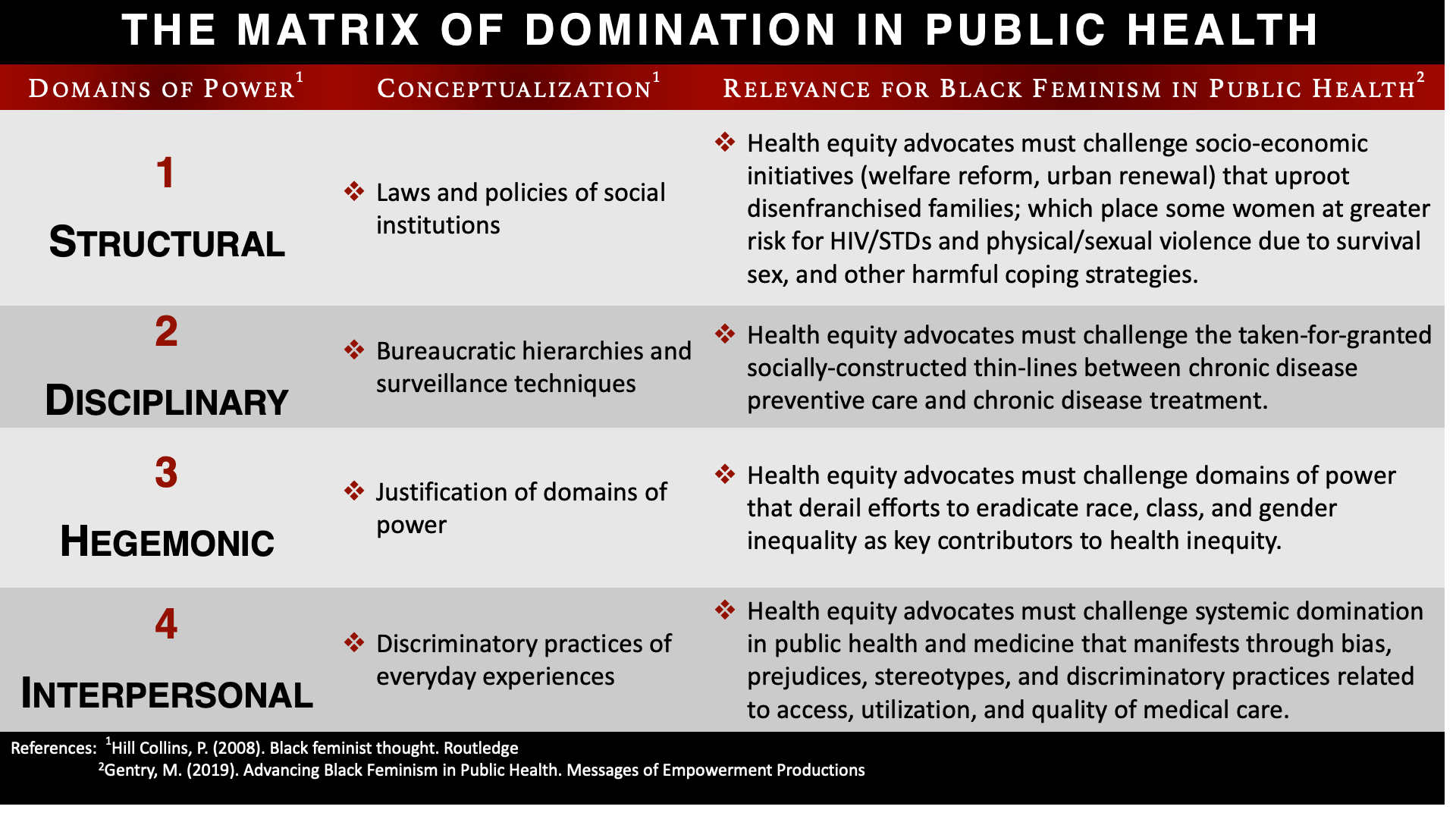
Welcome to my blog on “Advancing Black Feminism in Public Health.” My goal is to move black feminism from the margins to the center of public health by applying 10 key principles as legitimate and comprehensive frameworks for adequately addressing health threats and related social and structural determinants of health in the lives of black women and girls.
Dr. Quinn M. Gentry
In this blog, I highlight the significance of principle no. 5 (of 10): Challenge the matrix of domination in advancing black feminism in public health. As articulated in Hill Collins’ Black Feminist Thought, the matrix of domination refers to the hierarchical power relations in organizations that govern our society. Within public health, the matrix of domination operates as social and structural determinants of health in the everyday lives of black women and girls.
“A matrix of domination standpoint explains the inherent difficulty of obtaining health equity by adequately addressing intersecting systems of oppression with unilateral program and policy changes.”
Dr. Quinn, Intellectual Influencer Tweet
My work in advancing black feminism in public health deconstructs Hill Collins’ conceptualization of the matrix of domination into four (4) domains of power operating within public health systems and organizations.

In advocating for black women’s health equity, we must strengthen our competencies in structural interventions in order to confront the matrix of domination. In my view, enhanced educational options are more appropriate for younger marginalized individuals. However, economic interventions have the potential for greater impact in the lives of those over the age of 18, who have experienced years of systemic socio-economic barriers. Economic empowerment programs addressing structural determinants of health should include the following core elements:
I selected sociological perspectives as conceptual frameworks for challenging the matrix of domination in public health. Collectively, they serve as intellectual tools for confronting the taken-for-granted practices that heighten marginalized groups’ public health threats.
“What does it mean when the tools of a racist patriarchy are used to examine the fruits of that same patriarchy? It means that only the most narrow parameters of change are possible and allowable."
Audre Lorde, Black Feminist Thinker, Author, Lecturer Tweet
As Lorde suggests, in challenging the matrix of domination in public health, we must trade “narrow parameters” for more ambitious structural interventions that enhance disenfranchised people’s economic opportunities. For all the reasons articulated in the consciousness raising points earlier, I advocate for greater investments in helping people who have been damaged by the matrix of domination in entrepreneurship. In leading by example, and based on my own background in brand management and new business development, my contribution to addressing the matrix of domination from an economic empowerment standpoint has been to teach an entrepreneurial workshop I developed titled: “Give it All You Got!: Unleashing Your Entrepreneurial Spirit”:
"The master’s tools will never dismantle the master’s house."
Audre Lorde, Black Feminist Thinker, Author, Lecturer Tweet
Embracing a black feminist standpoint in public health means challenging ineffective tools aimed at addressing health issues for black women and girls.

In challenging the matrix of domination in public health, understand that not only are you confronting unfair systems and practices, but you may also be threatening the very livelihoods of those who benefit from the continued demise of marginalized peoples.
More by Dr. Quinn M. Gentry here.
HPHR.org was designed by ComputerAlly.com.
Visit HPHR’s publisher, the Boston Congress of Public Health (BCPH).
Email communications@bcph.org for more information.

Click below to make a tax-deductible donation supporting the educational initiatives of the Boston Congress of Public Health, publisher of HPHR Journal.![]()